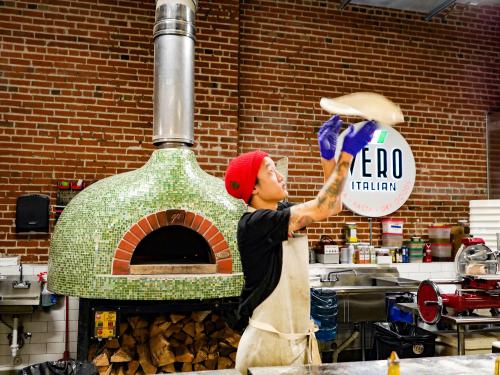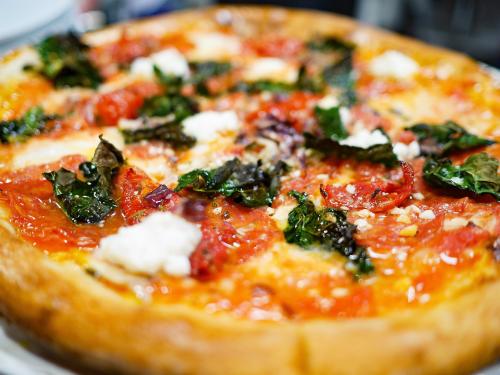The best food isn’t showy or pretentious. Many agree that truly great cooking adheres to tradition and exemplifies it. Andrea Frizzi knows this. He proves it time and again.
For the past 10 years, it’s been through his trattoria, the former Il Posto restaurant, where chefs are trained to recreate upscale, Northern Italian recipes using Mother Nature’s bounty, imported meats and pastas, and techniques first developed during the Roman Empire. The Milanese chef’s latest and grandest homage to his native Italy is the $18,000 oven imported from Naples, which reaches a steady 900 degrees at Vero Italian, the pizzeria he op ened at Denver Central Market in September 2016.
ened at Denver Central Market in September 2016.
Frizzi knew if he was going to make pizza for Denverites, he was going to do it right. That meant bringing in a 5-ton, wood-fired oven from Naples, Italy, where it’s generally agreed the classic dish was introduced in its modern form. Since opening in the gourmet food hall in the River North Art District (RiNo), Vero’s pizzas have just about assumed cult status.
The chef is uncompromising in his selection of ingredients, starting with the same Caputo 00 flour used in Neapolitan pizzerias. It’s as fine as baby powder and results in a crackly, crispy and slightly chewy dough. Fresh low-moisture mozzarella may be pricier and harder to get than standard cheeses, but its meltability can’t be beat. The cured meats, olive oil and sea salt are imported from their perspective towns of origin, and the fresh toppings are sourced locally. Some come from neighboring food stands at Denver Central Market. Yet, none of that would matter much if it weren’t for the oven, which Frizzi has lovingly named “Maria” after his mother.
For a pizza to achieve the ultimate in authenticity, it has to be baked in an oven hand-made in Naples using volcanic rock from nearby Mount Vesuvius. Although Frizzi doesn’t technically bake in this style (he prefers the Milanese variety from his childhood, which is similar, but crispier, thinner and a touch bigger), he’s true to form where it counts: the cooker. The Neapolitans “perfected pizza and made the perfect oven for it,” he says. In other words, if you want to be the best, you have to learn from the best.
From Naples, Maria was shipped to California where she was adorned with striking mosaic tiles, similar to the ones that line the counter where diners sit. Meanwhile, pizzaiolos stretch, toss and bake whole pizzas from scratch in an open-air kitchen.
Denver Central Market isn’t lacking on the design front—the whole space is gorgeous. Still, the oven stands out  for its size and dazzling color. Getting it there, though, was no easy feat. “It took a fork lift, a palette jack, four dollies and eight men,” says executive chef Mario Pacheco.
for its size and dazzling color. Getting it there, though, was no easy feat. “It took a fork lift, a palette jack, four dollies and eight men,” says executive chef Mario Pacheco.
Pacheco, Frizzi and general manager, Shane Burton, remained close to the oven around the clock for two nights and three days while it cured. “I slept on an air mattress right there,” Pacheco says, pointing to the small space between the open-air kitchen and the Italian pantry, where locals stock up on pastas, seasonings and sauces.
The intense heat is important. So is the wood. It’s what allows the pizzas to cook to perfection in under two minutes. Vero uses white American oak, which creates the right level of smokiness.
Cooking in a dome-shaped, stone-enclosed fire pit isn’t easy. “Pizza is very fickle,” Pacheco says. Chefs vigilantly watch the pizzas, pushing and pulling baking boards this and that direction depending on where the heat is going and how hot it’s burning in any given spot. A new pizzaiolo has to apprentice for at least a month before he or she can fly solo.
“We have a rigorous training process,” says Frizzi. “It starts with one week of dough making and prepping, two weeks of dough stretching, and then another week cooking side by side with one of our senior pizzaiolos.” These aren’t your average after-school pizza boys, they are serious cooks who bring experience and passion to the table. “All of them have what it takes,” Frizzi says. “I spent the first three months working with them on the styles, techniques and the idea of pizza–how it’s made in Milano.”
Vero means “real” in Italian, an apt description for this pizzeria.



